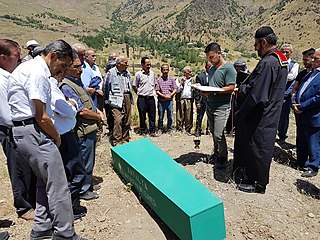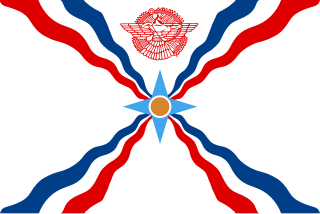
Assyrians are an indigenous ethnic group native to Mesopotamia, a geographical region in West Asia. Modern Assyrians descend directly from the ancient Assyrians, one of the key civilizations of Mesopotamia. While they are distinct from other Mesopotamian groups, such as the Babylonians, they share in the broader cultural heritage of the Mesopotamian region. Modern Assyrians may culturally self-identify as Syriacs, Chaldeans, or Arameans for religious, geographic, and tribal identification.

Sarcelles is a commune in the northern suburbs of Paris, France. It is located 16.3 km (10.1 mi) from the centre of Paris. Sarcelles is a sub-prefecture of the Val-d'Oise department and the seat of the arrondissement of Sarcelles.
Human rights in pre-Saddam Iraq were often lacking to various degrees among the various regimes that ruled the country. Human rights abuses in the country predated the rule of Saddam Hussein.

The Sayfo, also known as the Seyfo or the Assyrian genocide, was the mass murder and deportation of Assyrian/Syriac Christians in southeastern Anatolia and Persia's Azerbaijan province by Ottoman forces and some Kurdish tribes during World War I.

The Assyrian diaspora refers to ethnic Assyrians living in communities outside their ancestral homeland. The Eastern Aramaic-speaking Assyrians claim descent from the ancient Assyrians and are one of the few ancient Semitic ethnicities in the Near East who resisted Arabization, Turkification, Persianization and Islamization during and after the Muslim conquest of Iraq, Iran, Syria and Turkey.

Iraqi Assyrians are an ethnic and linguistic minority group, indigenous to Upper Mesopotamia. They are defined as Assyrians residing in the country of Iraq, or members of the Assyrian diaspora who are of Iraqi-Assyrian heritage. They share a common history and ethnic identity, rooted in shared linguistic, cultural and religious traditions, with Assyrians in Iran, Turkey and Syria, as well as with the Assyrian diaspora elsewhere. A significant number have emigrated to the United States, notably to the Detroit and Chicago; sizeable communities are also found in Sydney, Australia and Södertälje, Sweden.
Minorities in Iraq have been incredibly influential to the history of the country, and consist of various ethnic and religious groups. The largest minority group in Iraq is the Kurds, with Turkmen following shortly after. Prior to the 2003 invasion of Iraq, Assyrians constituted a sizeable population of 1.5 million, and belonged to various different churches such as the Assyrian Church of the East, Chaldean Catholic Church, and the Syriac Orthodox/Catholic Churches. Other minority groups in Iraq include Armenians, Mandaeans, Baha'i, and Marsh Arabs, among others.

Assyrians in Turkey or Turkish Assyrians are an indigenous Semitic-speaking ethnic group and minority of Turkey who are Eastern Aramaic–speaking Christians, with most being members of the Syriac Orthodox Church, Chaldean Catholic Church, Assyrian Pentecostal Church, Assyrian Evangelical Church, or Ancient Church of the East.
Assyrian Canadians are Canadians of Assyrian descent or Assyrians who have Canadian citizenship. According to the 2011 census, there were 10,810 Canadians who claimed Assyrian ancestry, an increase compared to the 8,650 in the 2006 Census.

The Assyrian homeland, Assyria, refers to the homeland of the Assyrian people within which Assyrian civilisation developed, located in their indigenous Upper Mesopotamia. The territory that forms the Assyrian homeland is, similarly to the rest of Mesopotamia, currently divided between present-day Iraq, Turkey, Iran and Syria. In Iran, the Urmia Plain forms a thin margin of the ancestral Assyrian homeland in the north-west, and the only section of the Assyrian homeland beyond the Mesopotamian region. The majority of Assyrians in Iran currently reside in the capital city, Tehran.
Iraqi Americans are American citizens of Iraqi descent. As of 2015, the number of Iraqi Americans is around 145,279, according to the United States Census Bureau.

Christianity, which originated in the Middle East during the 1st century AD, is a significant minority religion within the region, characterized by the diversity of its beliefs and traditions, compared to Christianity in other parts of the Old World. Today, Christians make up approximately 5% of the Middle Eastern population, down from 13% in the early 20th century. Cyprus is the only Christian majority country in the Middle East, with Christians forming between 76% and 78% of the country's total population, most of them adhering to Eastern Orthodox Christianity. Lebanon has the second highest proportion of Christians in the Middle East, around 40%, predominantly Maronites. After Lebanon, Egypt has the next largest proportion of Christians, at around 10% of its total population. Copts, numbering around 10 million, constitute the single largest Christian community in the Middle East.

The Assyrian independence movement is a political movement and ethno-nationalist desire of ethnic Assyrians to live in their indigenous Assyrian homeland in northern Mesopotamia under the self-governance of an Assyrian State.

The Last Assyrians is a 2004 French documentary film by Robert Alaux.
The problem of Kurdish refugees and displaced people arose in the 20th century in the Middle East, and continues today. The Kurds, are an ethnic group in Western Asia, mostly inhabiting a region known as Kurdistan, which includes adjacent parts of Iran, Iraq, Syria, and Turkey.
This is a list of Assyrian populations by country according to official and estimated numbers. Due to a lack of official data in many countries, estimates may vary.
Assyrians in Greece include migrants of Assyrian descent living in Greece. The number of Assyrians in Greece is estimated at around 6,000 people.

The Paris metropolitan area has a large Maghrebi population, in part as a result of French colonial ties to that region. As of 2012 the majority of those of African origin living in Paris come from the Maghreb, including Algeria, Morocco, and Tunisia. There were 30,000 people with Algerian nationality, 21,000 persons with Moroccan nationality, and 15,000 persons with Tunisian nationality in the city of Paris in 2009. In addition, there are thousands of Maghrebi Jews who immigrated from Algeria, Tunisia and Morocco during the 1960s.
Kani Masi or Ain Nuni is a village and sub-district in Dohuk Governorate in Kurdistan Region, Iraq. It is located in the district of Amadiya and the historical region of Barwari Bala.

The Assyrian Confederation of Europe (ACE) is a European umbrella organisation for Assyrian national federations and organisations in Europe. It was formed on 22 April 2016 in Brussels, Belgium. The Brussels office was opened in April 2018. ACE works to connect and represent half a million Europeans of Assyrian descent.















